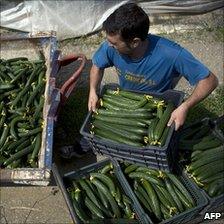E. coli puts spotlight on food chain complexity
- Published
- comments

Growers in southern Spain are destroying many tonnes of vegetables
The deadly E. coli strain which has never been seen in an outbreak before continues to baffle officials.
In Germany hundreds of tests have been carried out, but they can't pinpoint the cause. The authorities are still recommending that raw salad vegetables should not be eaten.
The facts are that nearly 2,000 people have been infected. All but two of the cases involve people who reside in or had recently visited northern Germany. Some scientists suggest that most probably the source of the outbreak is in Germany and that food from elsewhere is safe. But they can't be certain. That is reflected in official comments coming out of Germany.
The consumer protection ministry says authorities still do not believe meat or dairy products are the source of the outbreak.
Wenonah Hauter, from Food & Water Watch Europe, external, says the system of food production makes detection difficult.
"Food markets have consolidated into the hands of a few large corporations that deal in tremendous volume. Larger volumes and longer supply chains, in turn, make trace-back more difficult and put a larger number of consumers at risk if there is an incident of microbial contamination somewhere in the system," she says.
"The E. coli outbreak in Europe shows just how hard it can be to pinpoint where things go wrong in such a labyrinthine system."
Spain-Germany tensions
Originally the authorities in Hamburg identified the source of the outbreak as Spanish cucumbers. This was not only incorrect but led to a bitter argument between Spain and Germany. The Spanish Prime Minister, Jose Luis Rodriguez Zapatero, said "there is not the slightest indication that the origin of the serious infection is any Spanish product."
But the damage had been done: 150,000 tonnes of cucumbers went unsold in Spain. The cost to business is put at more than 200m euros ($290m; £177m) a week.
There are stories of workers being laid off. This is unusually sensitive because the agricultural sector is vital to a Spanish economy where over 20% are unemployed - the highest rate in the EU. Prime Minister Zapatero is seeking compensation.
He spoke to Germany's Chancellor Angela Merkel by phone. She regretted the damage caused, but said that the Hamburg authorities had acted in accordance with German law.
According to reports from Madrid, Mrs Merkel says she will push for EU compensation for Spanish farmers, although why the rest of the EU should pay for this is unclear.
In Germany the Robert Koch Institute (RKI), external, the national disease centre, is still advising consumers to avoid cucumbers, tomatoes and salad - whatever their origin.
There were reports today of a huge gathering in Dresden, but no salad was served. In a normal week vegetable growers see a turnover of a billion euros across Europe. Last week sales were at a standstill.
Yesterday a BBC team in Germany visited a cucumber grower who had just seen his major supermarket contract cancelled. He is left with vegetables but no market.